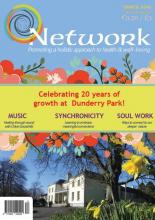The Mindful Writer

To get better at something, you need to focus on that one pursuit. But most of us have jobs and responsibilities that have nothing to do with what we love. These days, people aren't simply called to be carpenters or writers. We live in a world with the internet, cheap airfare, and scant job security. Chasing down one's calling leads us down a path that is messy, serpentine, and, from a certain angle, ridiculous. It is becoming increasingly true that you need to be a jack of all trades and stretch your limits to stay on the trail of your life's calling.
Picture two writers: one who does nothing but sit at the keyboard and bang away, day and night, and another writer who spends six hours each day as a construction worker, one hour in meditation, and only two hours writing. While the first writer, the one with a melange of repetitive strain injuries and caffeine, has spectacular focus, the second writer has diverse life experience.
It's a handy myth to believe that you were simply born to do a single thing, but if you think back, you will see that your life's calling has evolved and mutated repeatedly. Mine began with a love of exploring imaginative worlds as a kid with my brother. That grew into an interest in books. Two decades later, I painted landscapes and dug ditches in Italy. Five years later, I wired solar panels and built my own home by hand. Now two years later, I'm writing a science fiction novel. I glossed over twists and turns along the way, but the point is that the same inward calling changed outward manifestations. It would be a mistake to stay dedicated to the outward form of a pursuit when your passion asks that you develop new skills and try something new.
A few years ago, I purchased a property in rural Northern California, a ramshackle cabin on ten acres of oak woodland. My intention was and remains to create a small retreat center, a place for artists and meditators to stay for free or as part of a reasonable work exchange. I work daily to realize this goal, which entails a lot of manual labor - building new additions into the hillside, digging space for new rooms by hand. Contrary to the ‘do a single thing, and do it well’ philosophy, I am my own handyman, my own peasant laborer. The downside to learning many trades well enough to get various jobs done is that I do not devote that time toward mastery of a single trade. I do not get to write blog posts or practice hatha yoga as I saw through boards. However, for most people, and I think for writers in particular, it's good to have a lot of general knowledge at a depth that is greater than average. Even though that means less time at the writerly desk, it brings more diversity of experience to my craft. These days, I do my work, both in the yard and at the desk, with a very blue-collar approach, honing myself toward greater authenticity.
We have this notion that an artist or writer just does one thing, but it isn't so. I am not advocating against focus or dedication, and in no way encouraging flakily drifting from one pursuit to another. If you want to write well, you ought to focus on it at every possible moment. And when you're not focused on it, go where your heart tells you, and you will find good things there. Focusing on a single thing is vital - whatever you are doing at the moment, you have the opportunity to do it better than you ever have before. When you sit down to write, make that your sole activity; you will be better for it. When you eat, eat. When you ponder wiring diagrams, then, like it or not, pondering wiring diagrams is the entire universe. The point is to strive for a singular focus but not beat yourself up when that doesn't happen. It can all roll together and prove to be relevant if you persist and continue to refine.
Life calls us to do a variety of things, and I have found that meditation is the greatest aid to lubricate, unite and make usable diverse experience. One of the many results of the meditation-lubricated life is that the next time I need to articulate something, I find it easier to use parallel mental models; the patterns of thought flow more readily. It improves analogical and metaphorical thinking, and it helps to transition smoothly between different activities. The other day, I found myself plumbing the depth to water in my well and troubleshooting the solar powered pump controller. After some fairly involved electrical connections, I went back inside and resumed meditation, breathing with throat friction and counting my breath.
Quite possibly, I could get a lot more writing done if I never spent time in the garden and more time at the desk. It's also possible that this theoretical extra time would be less efficient - I might sit there uninspired, or might work and rework something. Without this garden time, I might work on a great many things that I end up not loving. By being a writer who sometimes follows his calling into the garden, I work toward authenticity.
Versatile introspection can take time to cultivate. And though meditation certainly requires time and focus, when you meditate, it seems to add time to the day rather than subtract it. Meditation is not used to develop material but as its own complete and fulfilling practice. Once you begin meditation, all outside ambitions fall away, and you truly meditate. Practiced wholeheartedly in its own right, it enriches sense experience, improves attentional quality, and helps to overcome creative blocks.
A calling supports every aspect of your life; it is your solace from the conflict and foment of the external world. Yet a calling also challenges you right at your core. You will confront blocks and obstacles, but you can also turn to it to escape or transcend the clutter and chaos of life. The more you devote to your calling, the more it becomes something you take with you everywhere, no matter what. No matter the chaos or beauty of your surroundings, you have your practice. True freedom is a calling that is always with you. And rather than distancing you from the world, it makes you feel one with the best of everything. Because it changes as you change, your personal calling clears away your habitual patterns so that your true self lives and moves with spontaneity.
Another useful component for living an integrated life amidst diverse practices is to set aside a sacred place that you go to with the sole purpose of practicing a discipline. Having a set-aside place tethers you to your practice and helps to anchor your life. Because the outside world offers no guarantees, your practice should support you.
Along with having a dedicated place, it's important to have a dedicated time. The diverse life really benefits from embracing the morning as the time to practice. There really is something magical about the morning. This early time is a hidden gem that arrives every day. Go anywhere in the world, and wake up early, and you will see a side of things few people ever see. Give your morning time to your most precious activities. Do so, and frame the rest of your day with less stress because the most important work is already done. Because your days are structured this way, you experience freedom. You can meet and interact with others with lightness and attention. Instead of feeling like every new task puts off the chance of having time to yourself, of doing something you really want, you have taken the oft-shared shrewd business advice to pay yourself first. You offer your morning to what you most love. Even if you don't have the option of making a living doing what you love, you have a better chance of feeling fulfilled when you structure your days around what's most important to you. You will glow in your endeavors.
Meditation for The Jack of Many Trades
Each morning, after bathing and a bit of stretching, meditate for 15-20 minutes. Sit with a straight spine and eyes closed and feel the sensation of breath come and go as thoughts come and go. If you depart from presence of mind toward a thought, return to the breath. With mindfulness, it is the return to the breath that is key.
Redefine Your Calling
Ironically, though your calling is your life's largest motivator, it is common for some of it to remain hidden from the conscious mind. Because it often changes outward form, it is important to keep a close relationship with its inner signature.
After a morning meditation, sit with the thought of your life's calling. What is at the core of your being? When you are most at peace and your mind unencumbered, what do you naturally feel moved to do?
Strive for a fresh definition. If you start with ‘to be a carpenter’ maybe let this develop into ‘to shape healthy wooden structures that connect people with nature’.
Search for certainty about the deepest desires of your heart and soul. Think about what you would want to fill your life if you had only a short time to live. What did you dream about as a child? If your calling feels impossible, search for the ground beneath it. For example, if you want badly to live with leopards in the jungle, and for you that isn't in any way an option, search for a deeper expression. Maybe it's that you want to help animals and to be in touch with animal wisdom.
Once you arrive at a fresh definition of your calling, then you have the gift of clarity, and everything you do in life can to lead you toward that. Continue to meditate and refine as the days progress. Meditation makes one a sponge for creative waters. It develops the fertile mind which can embrace the endlessly changing external circumstances and weave them into your calling.
Stephen is the founder and coordinator for Writing Immersion Retreats in Italy, Bali, and Mexico. He practices yoga, especially pranayama, in the Pranakriya tradition as taught by Yoganand Michael Carroll. He is the author of Writing From the Inside Out: The Practice of Free-Form Writing.
Latest Issue
Upcoming Events
-
17/04/2020 to 26/04/2020
-
18/04/2020
-
23/04/2020
-
15/05/2020 to 23/05/2020
-
16/05/2020 to 17/05/2020
Recent Articles
Article Archive
- November 2011 (2)
- January 2012 (3)
- February 2012 (2)
- March 2012 (2)
- April 2012 (4)
- May 2012 (4)
- June 2012 (1)
- July 2012 (3)
- August 2012 (2)
- October 2012 (2)

